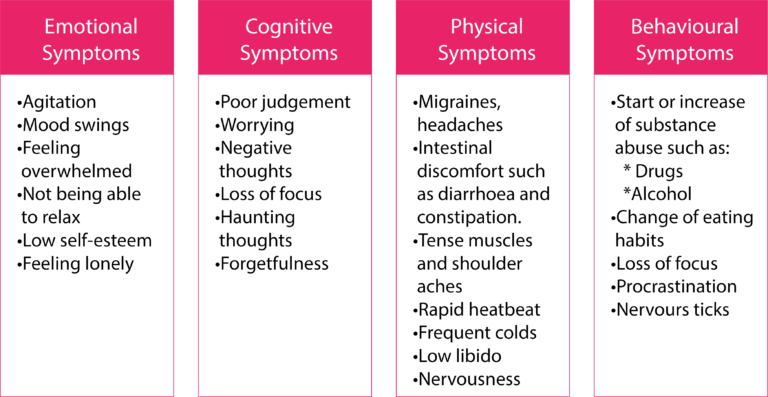What is stress?
Stress response is the way a person perceives and responds to a specific situation. What causes stress to one person could just be considered as a normal thing for another one. Stress response is individual to each one of us. We all react in different ways to different events.
We all experience stress at times in our lives. It could come from situations such as facing financial problems, looking after a family, being in an unhealthy relationship, having a non-fulfilling job or facing an illness.
Stress can be a necessity and a good thing as it helps us to save our lives when we are facing a harmful scenario. In this case, stress triggers a reaction called “Fight or Flight”.
What is Fight or Flight?
A fight or flight reaction arises when a threat is presented in front of us. For example, if we come face to face with someone who points a knife at us, the only thing we think of is to act quickly to get away from the threat. This situation generates stress in our body which leads to an increase in heartbeat, quick breathing, muscle contraction, raise of blood pressure, release of adrenaline and cortisol hormones. All these factors combined allow us to save our lives.
This type of stress is called Acute Stress, it is short lived and disappears when the threat.
However, sometimes life gets a little overwhelming and our body loses its capacity to discern threatening to non-threatening situations and activates stress in a permanent way. This is when stress becomes chronic.
When we are in a state of chronic stress, anything can be a trigger for stress. We then start to develop symptoms which, if untreated, can result in long-term complications.
Symptoms of Stress
Symptoms derived from stress are many and complex. They can be divided in four areas:
Emotional, Cognitive, Physical and Behavioural.

Long Term Conditions Linked to Stress
Chronic Stress can contribute and exacerbate these common issues:
- Mental Health Issues:
- Panic Attacks
- Anxiety
- Depression
- Migraine
- Insomnia
- Type 2 Diabetes
- Fatigue
- Obesity and eating disorders
- Skin Conditions:
- Acne
- Hair Loss
- Gastrointestinal problems:
- Gastritis
- Peptic Ulcers
- Acid Reflux (GERD)
- Indigestion
- IBS
- Cardiovascular issues:
- High Blood Pressure
- Increased PMS Symptoms (in women)
- Menstrual pain and irregularities (in women)
Statistics
Statistics give us a good idea on how stress affects many of us. A 2018 study by the Mental Health Foundation explains that:
74% of people have expressed overwhelming stress and not being able to cope.
- From these 74% the following have also been reported:
- 51% have also been feeling depressed
- 61% of them experienced anxiety
- 46% ate an unhealthy diet
- 29% started on increased their alcohol intake
References:
Goldstein, David S. “Adrenal Responses to Stress.” Cellular and Molecular Neurobiology, vol. 30, no. 8, Nov. 2010, pp. 1433–1440, www.ncbi.nlm.nih.gov/pmc/articles/PMC3056281/, 10.1007/s10571-010-9606-9.
Pondeljak, Nives, and Liborija Lugović-Mihić. “Stress-Induced Interaction of Skin Immune Cells, Hormones, and Neurotransmitters.” Clinical Therapeutics, Apr. 2020, 10.1016/j.clinthera.2020.03.008. Accessed 26 Apr. 2020.
Popa, Stefan Lucian, et al. “Pressure Management as an Occupational Stress Risk Factor in Irritable Bowel Syndrome.” Medicine, vol. 97, no. 49, Dec. 2018, p. e13562, 10.1097/md.0000000000013562. Accessed 26 Apr. 2020.
Qin, Hong-Yan. “Impact of Psychological Stress on Irritable Bowel Syndrome.” World Journal of Gastroenterology, vol. 20, no. 39, 2014, p. 14126, www.ncbi.nlm.nih.gov/pmc/articles/PMC4202343/, 10.3748/wjg.v20.i39.14126. Accessed 8 Mar. 2019.
Rousset, Laurie, and Bruno Halioua. “Stress and Psoriasis.” International Journal of Dermatology, vol. 57, no. 10, 4 May 2018, pp. 1165–1172, 10.1111/ijd.14032. Accessed 26 Apr. 2020.
Song, Eun Mi, et al. “The Association Between Reflux Esophagitis and Psychosocial Stress.” Digestive Diseases and Sciences, vol. 58, no. 2, 22 Sept. 2012, pp. 471–477, 10.1007/s10620-012-2377-z. Accessed 26 Apr. 2020.
Spruill, Tanya M. “Chronic Psychosocial Stress and Hypertension.” Current Hypertension Reports, vol. 12, no. 1, 27 Jan. 2010, pp. 10–16, 10.1007/s11906-009-0084-8. Accessed 7 May 2019.
“Statistics.” Mental Health Foundation, www.mentalhealth.org.uk/statistics/mental-health-statistics-stress
